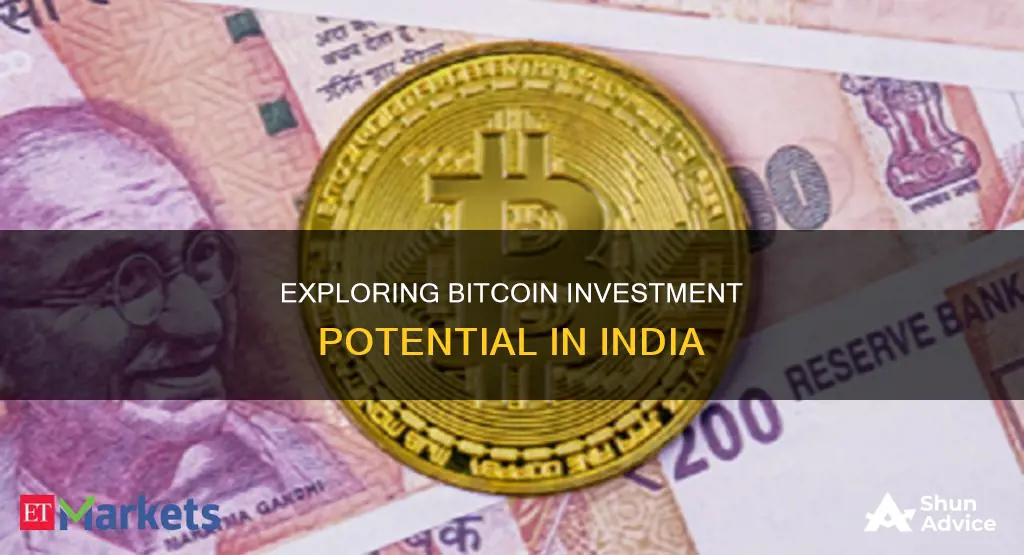
Bitcoin is a decentralised digital currency that no individual or organisation can control or alter. It is the first and most popular cryptocurrency or virtual currency in the world. It can be used as a mode of exchange and a store of value. In India, there is no minimum limit for investing in Bitcoin. An investor can buy Bitcoin in Indian Rupees with a minimum capital of Rs.100. This limit could vary between various crypto exchanges.
What You'll Learn

Bitcoin's legal status in India
Bitcoins Legal Status in India
Bitcoin is not considered legal tender in India, but it is also not illegal to hold or transact in Bitcoins in the country. The Cryptocurrency and Regulation of Official Digital Currency Bill, 2021, introduced in the Lok Sabha, seeks to create a framework for the Reserve Bank of India (RBI) to issue a digital currency. The bill also proposes prohibiting all other private cryptocurrencies, with certain exceptions, to boost the underlying technology.
The Indian government has not passed any official clarification on whether Bitcoin is legal or not, but one can conclude that it is illegal based on statements made by the RBI Governor and various government spokespeople, including the Finance Minister. However, there is no specific ban on Bitcoin in India. It is unregulated, but the government has imposed taxes on virtual assets, including a 30% tax on gains from cryptocurrencies and a 1% tax deducted at source.
The Reserve Bank of India (RBI) restricted commercial banks from facilitating Bitcoin transactions in 2018, but this order was rebuked by the apex court in 2020, allowing crypto exchanges to restart their business.
Despite the lack of a clear legal status, the Indian crypto market is active, with local exchanges, blockchain startups, and enthusiasts participating. However, it is crucial to approach this space with caution due to the volatile nature of crypto markets and the possibility of security breaches and scams.
Coinbase Crypto Investment: Best Bets for Your Portfolio
You may want to see also

How to buy Bitcoin in India
Bitcoin is not a legal currency in India, but it is possible to own and trade it on exchanges. Here is a step-by-step guide on how to buy Bitcoin in India:
- Find a reputed cryptocurrency exchange operating in India, such as ZebPay, Giottus, CoinDCX, or Unocoin. These platforms allow you to buy Bitcoin with Indian rupees (INR) and offer various payment methods.
- Create an account and complete the KYC process: You will need to provide personal information to the exchange, including your Aadhaar card, Pan Card, or other documents, to verify your identity.
- Select a storage option: You can create an online wallet or store your Bitcoin with a third-party provider. Some exchanges provide crypto wallets, or you can use cold wallets for more secure storage.
- Place an order for Bitcoin: Decide how much Bitcoin you want to buy. You can purchase Bitcoin directly on the exchange or use peer-to-peer marketplaces like Paxful, which offer various payment options.
- Make a payment: Transfer funds from your bank account to the exchange or directly to the seller on a P2P platform. You can also use digital payment methods like NEFT, RTGS, debit or credit cards, or mobile wallets like Paytm, Google Pay, or PhonePe.
- Securely store your Bitcoin: Once you have purchased Bitcoin, store it securely in a crypto wallet provided by the exchange or a third-party wallet of your choice.
It is important to remember that investing in cryptocurrencies like Bitcoin carries risks due to the volatile nature of the market. Ensure you understand the pros and cons and consider the risk factors before investing. Additionally, keep yourself updated with the latest regulations and guidelines regarding cryptocurrencies in India.
Investing in Bitcoin: Is $100 Enough to Get Started?
You may want to see also

Bitcoin wallets
There are two main types of crypto wallets: hot wallets and cold wallets. Hot wallets are connected to the internet and are often free to use, offering add-on services such as trading or staking in exchange for fees. Cold wallets, on the other hand, are not connected to the internet and are considered more secure. They tend to cost money as you have to buy a piece of hardware to store your crypto.
Hot Wallets:
- Crypto.com DeFi Wallet: Tailored for use in decentralized finance (DeFi), it has more than 1,000 assets and integrates with the Ledger hardware wallet.
- Zengo Wallet: Uses multi-party computation (MPC) to secure assets and perform transactions, eliminating the need for seed phrases and private keys.
- Coinbase Wallet: A separate product from the Coinbase exchange, it allows users to store cryptocurrency themselves, with easy integration to the Coinbase exchange.
- Trust Wallet: The official wallet of Binance, it supports more than 10 million types of digital assets and over 100 blockchains.
- MetaMask: Stores any digital asset built on Ethereum and integrates with many "Web3" applications.
Cold Wallets:
- Ledger: One of the best-known names in crypto wallets, it integrates with many popular software wallets and offers a mobile app, a dedicated desktop app, and two-factor authentication.
- Trezor: Offers some of the highest-end hardware available, with an entry-level model and a more expensive model with a touchscreen. Integrates with software products like Exodus and offers built-in services like staking and crypto purchases.
In addition to these options, it is worth noting that some cryptocurrency exchanges, such as Coindesk, ZebPay, and Coinbase, provide crypto wallets. These wallets allow users to securely store their purchased Bitcoins.
Winklevoss Twins' Bitcoin Bet: Millions Invested
You may want to see also

The minimum amount to invest in Bitcoin
Bitcoin is one of the most coveted cryptocurrencies across the globe. However, the industry is still evolving and slowly catching up in India. If you're based in India and are interested in investing in Bitcoin, it's important to first educate yourself on this asset class and the associated risks.
There is no defined minimum amount to buy Bitcoin in India. You can buy small units of Bitcoin if you don't want to purchase an entire cryptocurrency. In India, you can buy Bitcoin in Indian Rupees with a minimum capital of Rs.100. This limit may vary between different crypto exchanges. For example, CoinSwitch allows investments to start from as low as INR 100 in Bitcoin.
When you buy Bitcoin, you gain direct exposure to price movements. For example, if you buy Bitcoin when it's at $50,000 and it rises to $100,000 over a year, you will have made a 100% return on your investment. However, it's important to remember that this can also work the other way—if the price decreases after your purchase, you will make a loss.
While Bitcoin has experienced immense highs, it has also fallen to devastating lows. It's a very volatile investment, and experts don't recommend investing more than a small percentage of your money in it.
Litecoin Investment Strategies: How Much to Invest?
You may want to see also

Bitcoin's performance and volatility
Bitcoin's volatility is influenced by several factors, including supply and demand, investor actions, media coverage, and government regulations. As a relatively new and unregulated cryptocurrency with a limited supply, Bitcoin's price is susceptible to significant swings as investors speculate on its future and react to news and events.
Bitcoin's volatility is also reflected in its performance compared to other asset classes. From 2014 to 2023, it was the best-performing asset in seven out of ten years, but it was also the worst-performing asset in the other three years. During this period, Bitcoin averaged a 50% annualized return, outperforming every major asset class. However, Bitcoin's volatility remains elevated, with its volatility 3.9 and 4.6 times that of gold and global equities, respectively.
The impact of Bitcoin's volatility on a portfolio depends on the size of the allocation. Modest allocations can provide modest diversifying effects while tapping into a novel source of return. In contrast, large allocations can have an outsized impact on portfolio risk due to Bitcoin's standalone volatility.
Overall, Bitcoin's performance and volatility present both opportunities and risks for investors. Its high volatility can lead to significant gains or losses, and it may not be suitable for all investors. Investors considering Bitcoin should carefully assess their time horizon, risk tolerance, and investment objectives and use strategies such as small allocations, regular rebalancing, and dollar-cost averaging to navigate its volatility.
The Ultimate Guide to Bitcoin Exchange Investment
You may want to see also
Frequently asked questions
There is no minimum limit for investing in Bitcoin in India. You can invest a sum as low as Rs 100 or INR 100. However, it is important to note that Bitcoin is a very volatile investment, and individuals should educate themselves on this asset class before investing.
Bitcoin is not considered legal tender in India, and the Reserve Bank of India (RBI) has restricted commercial banks from facilitating Bitcoin transactions in the country. However, the RBI's order was rebuked by the apex court in 2020, and it is not illegal to hold or transact in Bitcoins in India.
You can purchase Bitcoin in India through various online Bitcoin exchanges, such as CoinDCX, ZebPay, Mudrex, WazirX, and CoinSwitch. These exchanges offer different payment options, including bank transfers, net banking, UPI, and credit or debit cards.
Bitcoin is a highly volatile investment, and its value can fluctuate significantly. While it has experienced immense highs, it has also fallen to devastating lows. There is always a risk of losing your capital, and experts recommend investing only a small percentage of your money in Bitcoin.







